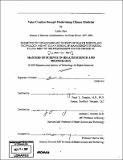Value creation through modernizing Chinese medicine
Author(s)
Sun, Lizhe
DownloadFull printable version (9.137Mb)
Other Contributors
Harvard University--MIT Division of Health Sciences and Technology.
Advisor
Frank L. Douglas and Anthony J. Sinskey.
Terms of use
Metadata
Show full item recordAbstract
My first hypothesis in this thesis is that there is significant value vested in traditional Chinese medicine that can be captured by converting them into ethical drugs through scientific analysis, screening and validation. Further, holistic treatment is a key difference between traditional Chinese medicine and western-type chemical drugs, which makes Chinese medicine a very valuable category of knowledge. Using mixed formula is a primary method of treatment in Chinese medicine. It is the application of distinctive medical philosophies of Chinese herbal medicines in practices, reflecting the uniqueness and advantages of Chinese medicine. For example, there are 96,592 mixed formula recorded by "Dictionary of Chinese Medicine Mixed Formula" published in 1997. My second hypothesis in this thesis is that value can be created and captured, under the globalization context, from mixed herbal formulas for the mainstream world market with the aid of fingerprint technologies. To enter western markets as officially approved drugs through critical pathways, both scientific and regulatory, Chinese herb drugs must demonstrate sound evidence for safety and efficacy. I address in this thesis one of the central concerns of the pharmaceutical companies and FDA, that is, how quality control and material consistency is assured and how toxicity and drug kinetics of Chinese herbal medicines, either in its raw form, its purified form, its composite extract form or its mixed formula form, may be measured with reasonable scientific certainty and what would be the likely trajectory of further research. (cont.) My thesis research involves the following aspects: firstly, I characterize, by and through historical review and analysis, the formation of unique Chinese holistic medical philosophy to apply herbal medicines, particularly mixed herbal formulas, to systematically modulate the human body to prevent illnesses, to combat health problems and to restore balanced health; secondly, I performed a comparative study on the regulatory systems between Chinese SFDA and US FDA to provide insights on the trend of harmonic convergence of laws and regulations and challenges going forward, including collection and extrapolation of relevant statistical data; thirdly, I researched emerging fingerprint technologies to address the central issues of standardization, quality control, material consistency, safety and efficacy measurements of Chinese herbal medicines; fourthly, I performed data collection on major Chinese sources of published literatures and patent applications/grants for public and private medicinal knowledge formation, which may be viewed as a surrogate indicator for embedded economic value in the system, to compare trend and gaps between China and developed countries; and lastly, I presented three case studies of development of an-diabetic drugs from herbal sources, to illustrate how value may be created and captured through using modern technologies to tap into the accumulative knowledge base in herbal medicine. The thesis concludes that there are significant values to be captured, by and through cross-border collaborations under the globalization context, from Chinese herbal medicine. Both ethical single molecular entity (singleton) herb-derived drugs and mixed formula herb-derived drugs may be created going forward.
Description
Thesis (S.M.)--Harvard-MIT Division of Health Sciences and Technology, 2007. Includes bibliographical references (leaves 110-114).
Date issued
2007Department
Harvard University--MIT Division of Health Sciences and TechnologyPublisher
Massachusetts Institute of Technology
Keywords
Harvard University--MIT Division of Health Sciences and Technology.